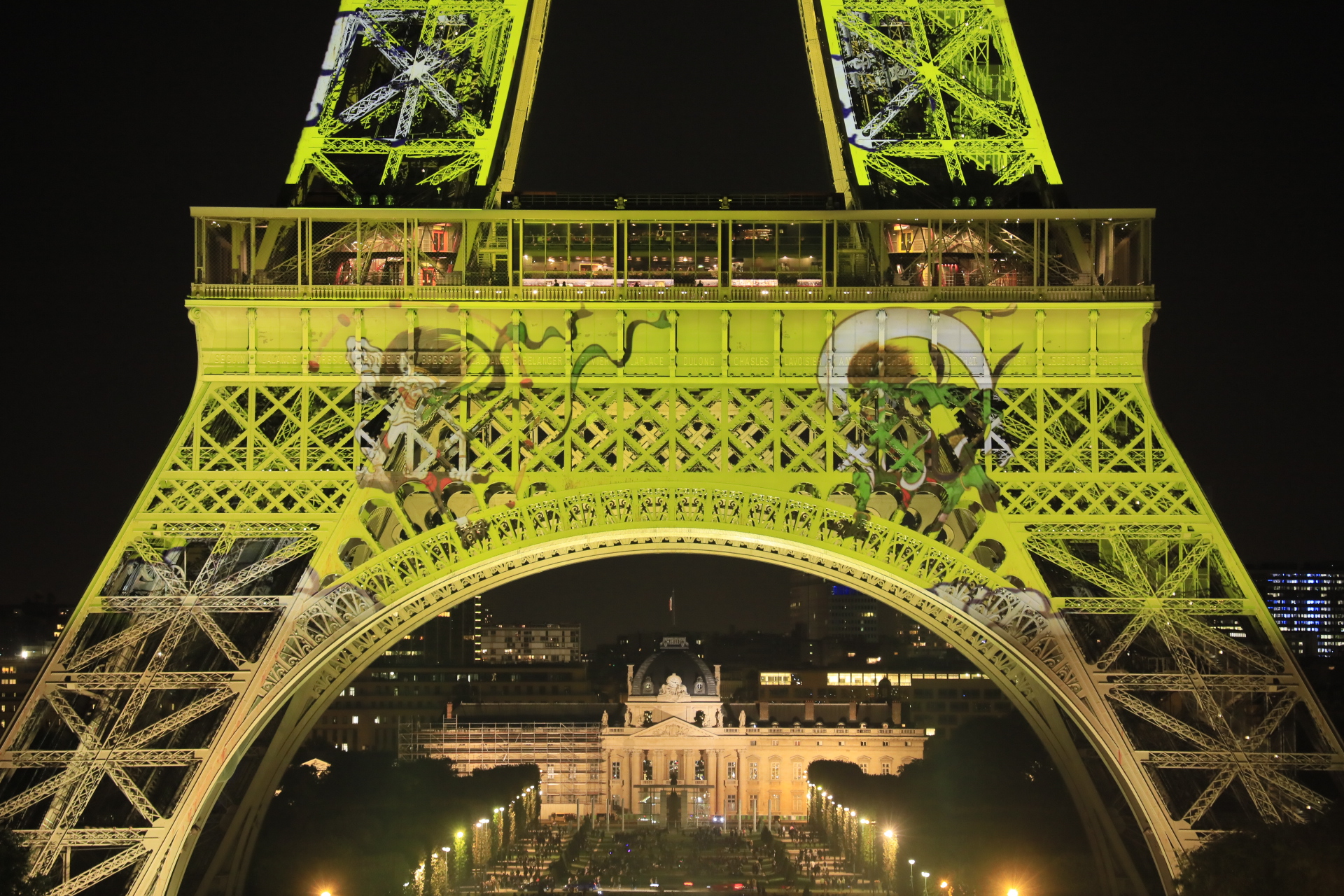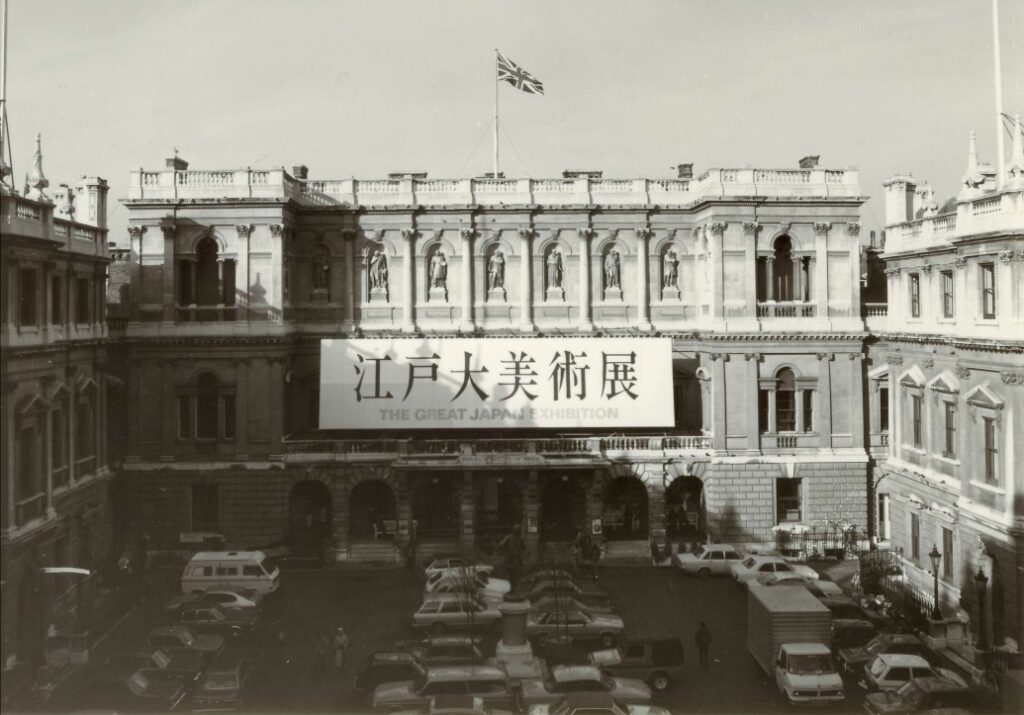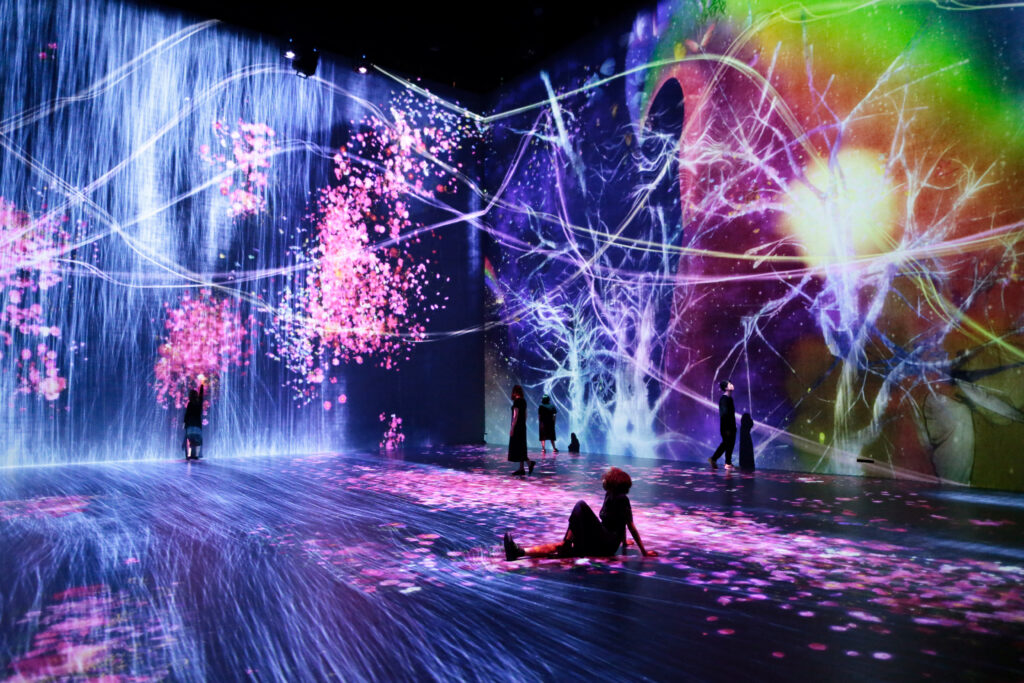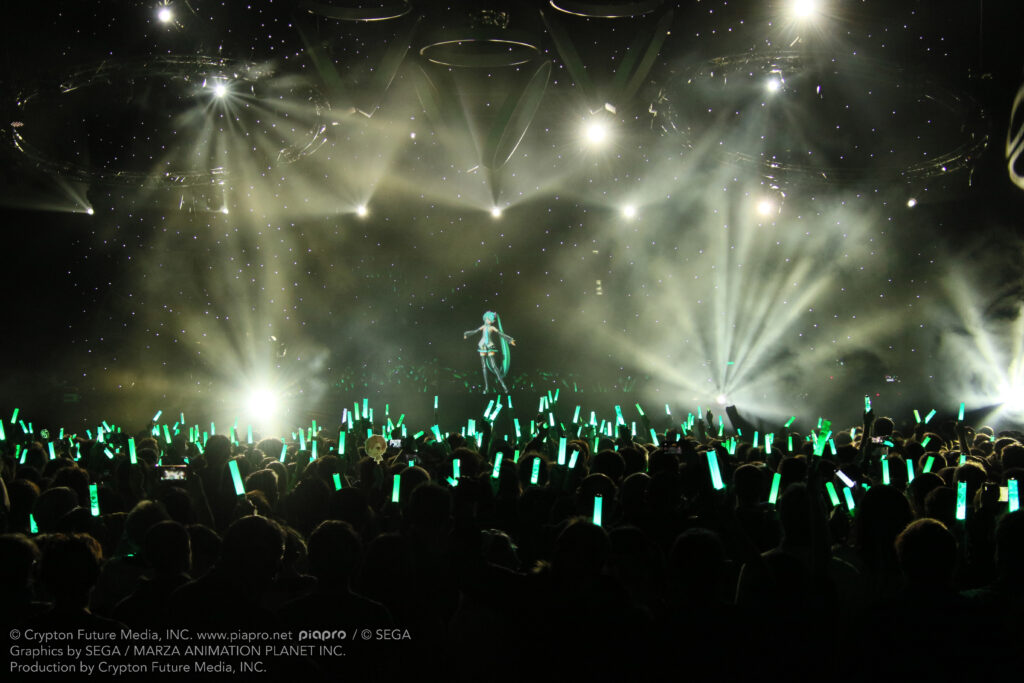2022.10.12
CULTURESouls in Resonance,
The Legacy of “Japonismes 2018”

The “Eiffel Tower Special Light-up – Eiffel Tower Dressed in Japanese Lights,” one of the official projects under Japonismes 2018. A variety of symbolic Japanese designs were projected sequentially onto the Eiffel Tower, including a view of “Fujin Raijin-zu Byobu” (The Wind God and Thunder God, screens painted by TAWARAYA Sotatsu and owned by Kennin-ji temple) (detail), a National Treasure which traveled to Europe. Planners and Producers: Motoko Ishii & Akari Lisa-Ishii
The Japan Foundation has had a focus on large-scale Japanese cultural festivals for many years. The key to broadening the understanding of Japan to as many as possible starts with the overall concept, coupled with close collaboration with the host country and related organizations.
The Japan Foundation (JF) introduces various elements of Japanese culture in creative ways. The quintessence of such an activity can be found in large-scale Japanese festivals. The “Japonismes 2018: les âmes en résonance” (“Souls in Resonance”) was considered particularly successful in terms of its ripple effect. As a Japanese festival, it was produced on an unprecedented scale, and was held in 2018, which marked the 160th anniversary of diplomatic relations between Japan and France. JF acted as the festival secretariat and took on full responsibility from the planning to the actual implementation. “We hope to introduce the ‘unknown Japan.’ This is the only aspect we want to promote through ‘Japonismes 2018,’” stated ANDO Hiroyasu, then President of JF, and Secretary General of the Secretariat.
“Japonismes 2018” was based on the concept of the Japanese aesthetic, and the resonance between Japan and France. Accordingly, humanity is considered an integral part of nature, which is itself revered and respected. Harmony is valued, and differing values are shared and coexist with a spirit of tolerance. “Japonismes 2018” sought to share such Japanese sensibilities with the people of France, from the ancient Jomon era to contemporary digital art.
Until then, the concept behind most large-scale Japanese festivals held overseas leaned towards whatever view of Japan the host country expected. “Japonismes 2018” was a joint project between Japan and France, and JF’s focus was to convey a view of the unknown Japan and the Japanese spirit through a program that evolved from ideas offered up by both parties, Japan and France.

“The Great Japan Exhibition: Art of the Edo Period 1600-1868” was the feature project for the large-scale Japanese Festival held in the U.K. in 1981-1982, and was co-organized by JF and the Royal Academy of Arts. It required four and a half years of collaboration between the U.K. and Japan. The exhibition featured 500 works of art, including National Treasures, and drew more than 520,000 visitors during its five-month run.
The introduction of Japanese arts and crafts at the International Exposition of 1867 in Paris brought Japanese culture to a much wider international audience, and the term “Japonisme” soon became popular. In 2018, some 150 years later, this new project was named “Japonismes 2018,” with the year added to draw a clear distinction from 19th century Japonisme, which included a fascination for Orientalism, and reflecting a desire to convey the “current” situation of the Japanese people.
Introducing the Unknown Culture of Japan from Ancient Times to the Present Day
However, the road to holding the festival was far from smooth. For example, when planning the exhibition “Jakuchū, the Colorful Realm of Living Beings,” the initial reaction from the French side was: “Jakuchū? Never heard of him – how about Hokusai?”
The Jakuchū exhibition, which was realized after much back-and-forth discussion, attracted 75,000 visitors during its limited four-week run, and was so successful that a long line of visitors formed in front of the Petit Palais, which hosted the exhibition. The French cultural magazine, Télérama, described the exhibition as: “An unforgettable experience,” “Jakuchū’s genius is in his detail,” and concluded the article with, “This exhibition is perhaps the most beautiful gift Japan has bestowed on us.”
-1024x768.jpg)
A long line in front of the Petit Palais in Paris, the venue for the “Jakuchū, the Colorful Realm of Living Beings” exhibition. The first full-scale Jakuchū exhibition in Europe proved immensely popular.
The subtitle, “Souls in Resonance,” reflects the concept of “resonance between Japan and France.” For its first exhibition in France as an official project, teamLab created a new experiential digital art exhibition, “teamLab: Au-delà des limites (Transcending Boundaries)” at the Grande Halle de La Villette. In the exhibition, the audience was able to become part of the full work, creating a natural immersive experience in a digital world. This art exhibition attracted 300,000 visitors. There were constant shouts of joy from children during the exhibition, and visitors commented: “The teamLab exhibition was like going on a unique journey that you could never experience elsewhere.”

The teamLab exhibition featured a space combining several artworks that were created digitally in real time and changed due to the presence of people. It proved extremely popular to physically dive into this art without boundaries. Exhibition view, teamLab: Au-delà des limites, 2018, Grande Halle de La Villette, Paris ©teamLab
TeamLab’s exhibition was not the only place for emotions that transcended language. Embodying the overall concept of the festival, the exhibition “FUKAMI – une plongée dans l’esthétique japonaise (Fukami, a plunge into Japanese aesthetics)” was held at Hôtel Salomon de Rothschild, a renovated 19th century mansion. Along with works by old and new Japanese artists such as ANREALAGE, MANABE Daito, Hokusai and SENGAI Gibon, works by Picasso and Gauguin were also on display in an ambitious attempt to create a dialogue between East and West over the entire space. On social media, many visitors expressed their satisfaction with the exhibition, describing it as “An exhibition immersing visitors in Japanese aesthetics.”
A wide range of stage performances were put on, from Gagaku court music to contemporary theater and dance, Vocaloid (featuring the popular character HATSUNE Miku) and 2.5D musicals. There were also large-scale special screenings introducing the 100-year history of Japanese cinema, as well as special features regarding Japan on local television. Many visitors, from avid fans of Japan to those who knew little about the country, enjoyed this sampling of Japanese culture, ranging from Japanese food, Japanese sake and crafts to festivals based on various locations in Japan. Also, they could enjoy events related to judo, tea ceremonies, flower arrangement, Zen and literature. The former Minister of Culture in France, Jack Lang, said, “With ‘Japonismes 2018’ we have seen a Japan that is far from stereotypical.”

HATSUNE Miku’s performance in France, an official “Japonismes 2018” event, on the first day of its first European tour, “HATSUNE MIKU EXPO 2018 EUROPE,” for which tickets sold out immediately. Many fans came to the venue at La Seine Musicale, and in a post-performance survey, all respondents agreed that their familiarity with Japan had increased.
The Importance of Connecting to the Future
During the eight months of “Japonismes 2018,” more than 300 events were held in more than 50 cities across Japan and France, attracting some 3.53 million visitors. This figure alone surpasses the 2.2 million population of Paris. It successfully conveyed the aesthetics and values of Japanese people through a wide variety of projects throughout its duration, but in order to ensure that this was not simply viewed as a one-off event, it has been essential to continue with so-called “follow-up events.”
One of the official projects was the “Interschool Presentation Day,” where high school students from Japan and France were able to interact. One year after the festival closed, in February 2020, JF invited some French high school students who participated in this project to Japan and provided them with opportunities for homestays, Japanese cultural experiences, and one-day enrollment in a Japanese high school. Since then, the project has fostered online exchanges among high school students.

During the “Interschool Presentation Day,” the younger generation took on a leading role. High school students from Japan and France gave presentations at the Japan Cultural Institute in Paris under the theme, “Discovering Japan-France Exchange through People, Their Lives, and Their Works: The Role of the Individual in History leading to Japonismes 2018.” Photo:©MIHO
With the enthusiasm for “Japonismes 2018” still fresh in people’s minds, in 2019 the stage moved to the United States for a Japanese festival called “Japan 2019.” JF carried out eight official projects mainly in Washington, D.C. and New York. Among them, three large-scale art exhibitions were held by American curators who conducted research in Japan as JF fellows. These exhibitions, the culmination of many years of Japanese studies and Japan-U.S. exchanges, were highly acclaimed by the local media as well for their unique perspectives in introducing the fascinating world of Japanese art.
Cultural and artistic exchanges is one area that appeals directly to people’s hearts, creates a sense of empathy that transcends language, and fosters a broad range of fans of Japan by facilitating new discoveries and the joy of shared creation. Japanese festivals, demonstrating such essence, are the perfect opportunity to showcase not only the ageless charm of Japan, but also its new “face” – which is constantly being updated. JF will continue to bring about these high-quality projects around the world with the cooperation of many people so that visitors can experience the multifaceted aspects of Japanese culture.

View of the “Shinto: Discovery of the Divine in Japanese Art” exhibition, one of the official projects under “Japan 2019.” Through six themes, including Shintoism and Buddhism, the exhibition unraveled the influence on Japanese art by reverence for the gods. Dr. Sinéad Vilbar, Curator of Japanese Art at the Cleveland Museum of Art, who curated this exhibition, conducted research at Tohoku University as a 2002 JF Fellow. Photo by David Brichford; courtesy of the Cleveland Museum of Art.
【Related pages】
“Shunkan,” “Antigone,” “The Cherry Orchard,” Expanding the Circle of Excitement beyond Language Barriers
Three Exhibitions Opening Up New Dimensions; Japanese Art and Architecture as Perceived by Overseas Curators
International Film Festival: A Great Opportunity to Experience Other Cultures, Everyday Lives and the World’s Diversity
American Scholar Revealed the Profound World of The Tale of Genji
Bringing Together Hearts Around the World Through “A Wild Haruki Chase”
The Hub of Japanese Culture on the Banks of the Seine, Welcome to the Japan Cultural Institute in Paris
